Colin Dexter, Morse’s Greatest Mystery
£50.00
Colin Dexter is the Oxford don of classic crime. Wonderfully entertaining his Morse and Lewis characters are national treasures. Many has said that Morse is an iconic detective hero worthy to rank alongside Holmes, Marple and Poirot. But here June Thomson, an authority on Holmes, draws out the particular qualities of Morse.
Out of Stock
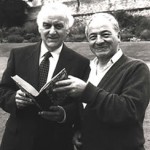
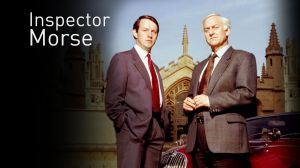 Colin Dexter was discovered by the collecting fraternity a few years after the long running Morse television series began in 1987. His first two books, nice fine first editions, were rarely priced at more than £60. The main reason for this was that detective fiction was a specialism and dealers of valuable collectibles stocked only literary fiction, unless of course, their was a demand. After the initial burst energy of a book a year for three years, the pace slackened to a book every other year or every third year. Dexter wrote for fun not for profit. Following the acclaimed series with John Thaw the author of the books was sought out for speaking engagements. It is said that he attended Buckingham Palace to read the Morse books to no less than Her Majesty. He was sought out by a pop music agent to give a presentation on Morse and his writing to a packed theatre. These feats compare in magnitude to the large literary figures of yesteryear such a Oscar Wilde.
Colin Dexter was discovered by the collecting fraternity a few years after the long running Morse television series began in 1987. His first two books, nice fine first editions, were rarely priced at more than £60. The main reason for this was that detective fiction was a specialism and dealers of valuable collectibles stocked only literary fiction, unless of course, their was a demand. After the initial burst energy of a book a year for three years, the pace slackened to a book every other year or every third year. Dexter wrote for fun not for profit. Following the acclaimed series with John Thaw the author of the books was sought out for speaking engagements. It is said that he attended Buckingham Palace to read the Morse books to no less than Her Majesty. He was sought out by a pop music agent to give a presentation on Morse and his writing to a packed theatre. These feats compare in magnitude to the large literary figures of yesteryear such a Oscar Wilde.
Morse’s Greatest Mystery (1993 )is Dexter’s first collection of detection stories. It contains eleven stories, six with Morse and fiv e others with various themes of crime and criminality. An author of the Appreciation is June Thomson, a noted crime writer (DCI Jack Finch series, and the same age (born 1930) as Colin Dexter. She also shares with Colin a love of the classic detective story. She is an authority on Arthur Conan Doyle and has produced some highly successful Sherlock Holmes pastiches. She describes in her Appreciation why Dexter is a satisfying writer and his skill at developing his stories. This volume was published as a signed limited edition of 99 copies and 20 specially bound presentation copies.
e others with various themes of crime and criminality. An author of the Appreciation is June Thomson, a noted crime writer (DCI Jack Finch series, and the same age (born 1930) as Colin Dexter. She also shares with Colin a love of the classic detective story. She is an authority on Arthur Conan Doyle and has produced some highly successful Sherlock Holmes pastiches. She describes in her Appreciation why Dexter is a satisfying writer and his skill at developing his stories. This volume was published as a signed limited edition of 99 copies and 20 specially bound presentation copies.
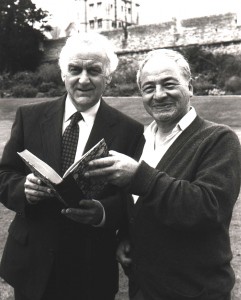
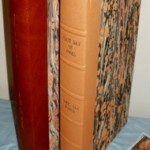 James Lee Burke, Feast Day of Fools
James Lee Burke, Feast Day of Fools
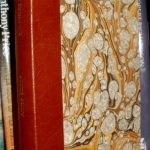 Louise Penny, Glass Houses
Louise Penny, Glass Houses

Rating by June Thomson on May 17, 2012 :
An extract from the Appreciation by June Thomson
“The wit is here in plenty. So, too, is the erudition, never forced on the reader’s attention, but carried lightly and easily. This is a quality of Colin Dexter as a crime writer which is particularly admirable. He never underestimates his reader’s intelligence. Despite the twists and turns of the plot and the rich scattering of clues, some of them apparently inconsequential, he never cheats and the denouements, while retaining the essential quality of surprise, are nevertheless perfectly fair and therefore satisfying. One never feels let down by the endings as is the case with crime fiction. The evidence has been there all the time, as cunningly worded as a clue to one of the crossword puzzles to which Chief Inspector Morse is addicted, so baffling at the time, so dazzlingly obvious once the answer is explained. ‘Of course!’ we exclaim. ‘Now why didn’t I see that for myself? It’s the only possible solution.’ In much the same way as we, the readers, are challenged to use our intelligence in following the clues to the murderer’s identity, Colin Dexter trusts us to use our perspicacity in gathering up the evidence for the character of Chief Inspector Morse. We are not spoon-fed with long descriptions of his appearance or personality. Like the wit and the erudition, the clues are there for us to find and it is left to our imaginations to pick them up and piece them together for ourselves. If we have done our job properly, as Colin Dexter expects of us, the result is a complex and totally believable character, endearing and infuriating at the same time, full of all the contradictory qualities of human nature. It is one of the reasons for Morse’s popularity. We feel we have taken part in his creation and that the picture of him we carry in our heads is ours; it also explains why the Central Television series was such an enormous success. Morse was already there on the page, a fully realised character which was immediately recognised and recognisable. Like all of us, Morse has his weaknesses and it is this quality in him which makes him so believable. He is irascible; he drinks too much; he is mean about paying for his round in the pub; he can be maddeningly pedantic at times. Even as a professional policeman, he is fallible, jumping too enthusiastically to the wrong conclusions or allowing himself to be diverted from the case in hand by a pretty girl who arouses in him randy fantasies, more often than not unrealised. He dislikes flying, hates the sight of blood, is afraid of spiders. He is also vulnerable and lonely, as well as capable of unexpected and sometimes unrevealed acts of generosity although Colin Dexter is too subtle a writer to allow this side of Morse to become too apparent. In Last Seen Wearing, the discerning reader will notice that when Morse buys grapes for Lewis, off sick with pharyngitis, it is described as a ‘small bunch’. It is this type of detail, slyly humorous and so easily passed over, which makes Colin Dexter’s books such a delight to read”.
Rating by Kirkus Reviews on May 17, 2012 :
Kirkus review
“Eleven stories, including six featuring irascible, imposingly well-read Inspector Morse. Criminals mostly take the honors for ingenuity in the other five, which range from prison escapes (a favorite theme) to confidence schemes to a redaction of one of Sherlock Holmes’s most celebrated cases. Most readers, though, will turn first to the Morses, although they don’t reveal Dexter consistently at his best. The title story is little more than a trifle recasting Morse as a reformed Scrooge; “As Good as Gold” a chance for him to fake evidence; “Neighbourhood Watch” a new turn on a familiar urban legend; and “Last Call” a routine job of detection. But “Dead as a Dodo” is a little gem of ingenuity, and “The Inside Story”–a substantial tale of murder doubling as a crime story written by the victim–is a masterpiece, a Morse novel in miniature. Even in the short form, Dexter (The Daughters of Cain, p. 270, etc.) never writes the same piece twice, and his headlong pace–the stories are miracles of velocity despite their cargo of allusions–keeps you from ever seeing ahead of him. Old fans of Morse and Dexter will devour this batch at a single gobble.”